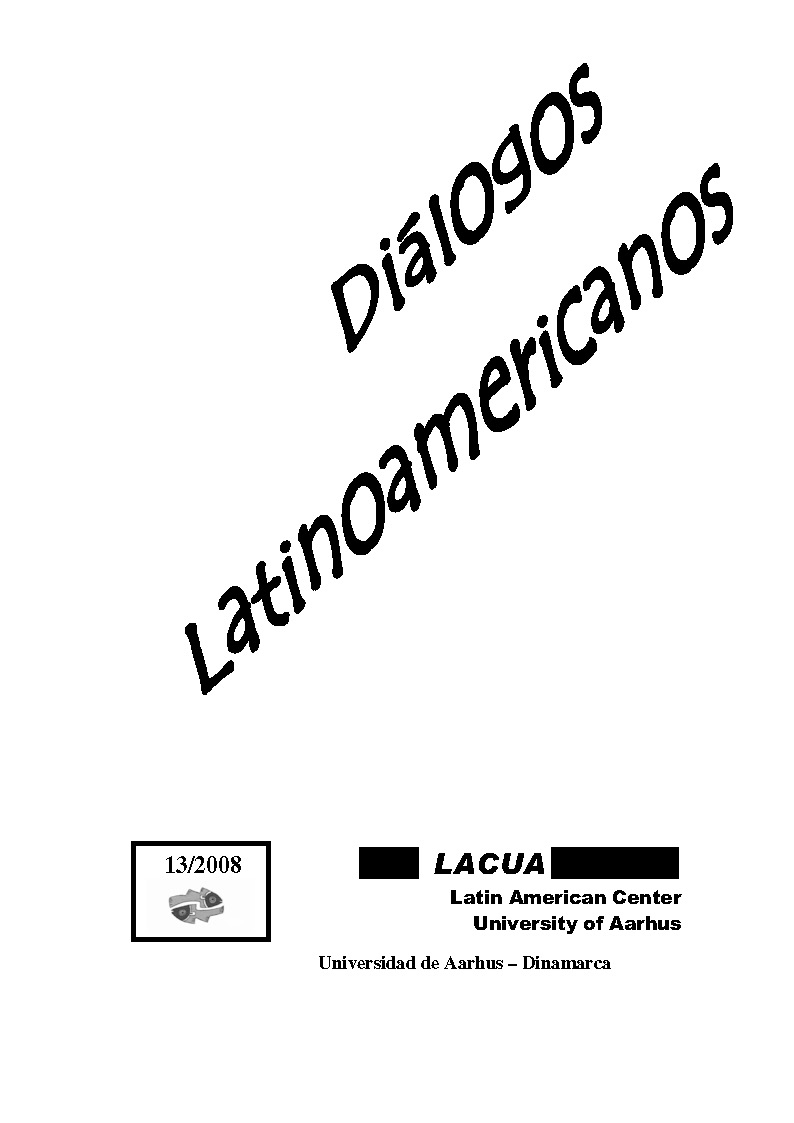EL MOSAICO DE LAS LENGUAS DE BOLIVIA
Las lenguas indígenas de Bolivia ¿Obstáculo o herramienta en la creación de la nación de Bolivia?
DOI:
https://doi.org/10.7146/dl.v9i13.113608Keywords:
Politica lingüística, Lenguas originarias, Reconstrucción de Estado-Nación, Languas Oficiales, Identidad comúnAbstract
In Bolivia, the Spanish language as the language of the conquerers
was the only official language for centuries while the native
languages almost disappeared. The purpose of the new president
in Bolivia since 2006, Evo Morales, is to create a nation by using
a language policy in which the original languages, Quechua,
Aymará y Guaraní are also official languages, together with more
than 30 other native languages. The new Bolivian state will be
bilingual as all Bolivians have to speak two languages: The
Spanish speaking groups have to learn a native language, and the
native groups have to learn Spanish. This is done in order to create
a common identity among the many different people and cultures
represented in Bolivia, but in his intent to give back their identity
to the original people by recognizing the native language,
Morales has met serious problems from the other social groups.
References
oficiales 12.12.06. http://abi.bo/index.php?i=noticias_texto&j=20061212161734
Agencia Bolivariana de Noticias. 2007. Bolivia comenzará proceso de alfabetización en
lengua aymará. 31.03.2007.
http://www.abn.info.ve/gonews5.php?articulo=87674&lee=18
Albó, Xavier. 2007. Movimientos Indígenas desde 1900 hasta la actualidad. In Jesús
Espasandín López y Pablo Iglesias Turrión. (ed.) BOLIVIA en movimiento. Acción
colectiva y poder político. España: El Viejo Topo.
Álvaro, Carlos. 2006. Se ha traduciodo “El Quijote” al Quechua. 11.06.06.
http://www.nortecastilla.es/pg060611/prensa/noticias/Segovia/200606/11/VAL-SEG-
099.html
Alzamora Antonio J.Faz..2003.En Puerto Rico el español debe ser el primer idioma. En.
Unidad en la Diversidad.
http://www.unidadenladiversidad.com/historico/opinion/opinion_ant/2003/noviembre
2003/opinion_191103.htm#Inicio%20artículo
Anderson, Benedict. 1983. Imagined Communities. Reflections on the Origin and
Spread of Nationalism. London: Verso Editions and NLB.
Bergenholtz, Henning/Bisgaard, Jonna/ Lauritsen, Majken Brunsborg/Wichmann,
Kamilla Kvist. 2003. Sprogpolitik: So ein Ding müssen wir auch haben. Hermes,
Journal of Linguistics no. 31-2003. Aarhus. Denmark.
Capítulo Boliviano de los Derechos, Democraciay y Desarrollo Humana. 2007. La
libreta escolar del 2006 fue impresa en 9 idiomas. 29.01.07
http://www.derechoshumanosbolivia.org/noticias.php?noticia=NT20070129093456
Centro de noticias OPS/OMS Bolivia. Pueblos indígenas tienen alfabetos en sus
lenguas. (www.ops.org.bo/servicios/?DB=B&S11=2043&SE=SN)
Cerrón-Palomino, Rodolfo.2002. Para que sirve la lingüística histórica al hablante de
una lengua oprimida. In. Simposio La Lingüística al Servicio de Los Idiomas Indígenas.
Austín, Universidad de Texas. 5.-6. Abril de 2002.
http://www1.lanic.utexas.edu/project/laoap/cilla/cplail/cplail007.html
Cultura. Bolivia. Com. 2003. Alfabetos, una via para afianzar la identidad.
http://www.bolivia.com/noticias/autonoticias/DetalleNoticia16338.asp
Cusicanqui, Silvia Rivera. 2007. Enseñanzas de la Insurgencia Étnica en Bolivia. In
Jesús Espasandín López y Pablo Iglesias Turrión. (ed.) BOLIVIA en movimiento. Acción
colectiva y poder político. España: El Viejo Topo.
Diccionario de CLAVE.1996. Madrid: Cesma, S.A.
Diccionario de la Real Academia Española.1994. Madrid: Espasa Calpe
Escobar, Julia. 2004. Multilingüismo o plurilingüismo?
http://revista.libertaddigital.com/articulo.php/1276229176
Etnolingüistica: http://es.wikipedia.org/wiki/Etnoling%C3%BC%C3%ADstica
Foro Mundial de Alternativas. 2007. Bolivia aspira erradicar el analfabetismo en
2007.
http://www.forumdesalternatives.org/articulo.php?id=3189
Garrido, Mario Hubert. 2007. Bolivia: Fortalecimiento de la educación pública en
2007.
(www. Prensa-latina.cu)
Godenzzi Alegre, Juan Carlos. 2001. Política lingüística y educación en el contexto
latinoamericano: el caso del Perú. In. Congreso de Valladolid. Centro Virtual de
Cervantes.
http://cvc.cervantes.es/obref/congresos/valladolid/ponencias/unidad_diversidad_del_esp
anol/4_el_espanol_en_contacto/godenzzi_j.htm/
Hobsbawm, E.J. 1994. Nations and Nationalism since 1780 Programme, Myth, Reality.
Cambridge: University Press.
Idiomas.us. http://www.idiomas.us/ 27. feb 2008
Iturralde, F. Xavier. 2005. Lenguas indigenas y español. Bol.Pres.16.08.05
http://www.bolpress.com/art.php?Cod=2005002698
La Organización de Estados Iberoamericanos para la Educación, la Ciencia y la Cultura
(OEI) Bolivia - Con nueva ley, la educación será única para el área pública y privada
del país
http://www.oei.es/noticias/spip.php?article1047
La Razón Digital.2007 Aprender a leer y escribir en Bolivia: La Razón. Edición Digital.
22.1.07 http://larazon.glradio.com/versiones/20070122_005794/nota_245_381148.htm)
La Razon Digital .2007. ¿Habla un idioma nativo?. 8.0707.
http://www.la-razon.com/Versiones/20070708_005961/nota_247_450534.htm
López, Carmen. 2002: “Particpación indígena en la implementación de políticas
lingüísticas en la educación: Una experiencia con comunidades gauraníes bolivianas”.
World Congress on Language Policies. Barcelona, 16-20 April 2002.
http://www.linguapax.org/congres/taller/taller4/Lopez.html
Mamani, Zacarías Alavi: El colonialismo lingüistico y educativo en Bolivia. Simposio:
La gestión del multilingüismo: ¿Qué futuro para los idiomas indígenas minorizados?
http://www.reseau-amerique-latine.fr/ceisal-bruxelles/ET-DH/ET-DH-7-
ALAVI%20MAMANI.pdf
Prensa Latina: Bolivia: Traducirán a lenguas originarias debates de Constituyente
boliviana.
http://www.quechuanetwork.org/only_article.cfm?lang=s&path=083106_2102.htm
Reel, Monte. 2007. In Bolivia, Speaking Up For Native Languages. Government Push is
Plagued by Controversy. Washington Post. 30.01.07
http://www.washingtonpost.com/wpdyn/
content/article/2007/01/29/AR2007012901665.html
República de Bolivia, 2001a: 68 Instituto Nacional de Estadística. Bolivia.
Características sociodemográficas de la población indígena. La Paz., Instituto Nacional
de Estadísticas. La Paz, INE.
República de Bolivia, 2001b: 142. Instituto Nacional de Estadística. Características
sociodemográficas de la población de Bolivia. Instituto Nacional de Estadísticas. La
Paz, INE.
Salinas, Sonia Comboni /Nuñuez, José Manuel Juárez. 2001: Educación, cultura y
derechos indígenas: el caso de la reforma educativa boliviana. In:.Revista Ibero-
Americano. Número 27. Reformas educativas: mitos y realidades. Septiembre-
Diciembre 2001.
Smith, Anthony D.1998. Nationalism and Modernism. A Critical Survey of Recent
Theories of Nations and Nationalism. London: Routledge.
Smith, Anthony D. 2001. Nationalism: Theory, Ideology, History. Polity Press.
sTancara, Cándic. 2006. El bilingüismo será herramienta clave para la educación. La
Razón Digital 25.06.06. http://www.larazon.
com/versiones/20060625_005583/nota_269_301897.htm
Downloads
Published
How to Cite
Issue
Section
License
Counting from volume 31 (2022), articles published in Diálogos Latinoamericanos are licensed under CC-BY 4.0. Read more about the license terms here https://creativecommons.org/licenses/by/4.0/.
No Creative Commons license applied on volumes 1-30. All rights reserved by the authors. Readers may download, read, and link to the articles, but they cannot republish the articles.
With the publication of volume 31 (2022), authors retain the full copyright to their articles and give Diálogos Latinoamericanos the right to the first publication. Authors also retain copyright to earlier versions of manuscripts, such as the submitted (pre-print) and the accepted manuscript (post-print).
Copyright to articles published in volumes 1-30 is held by the authors.





